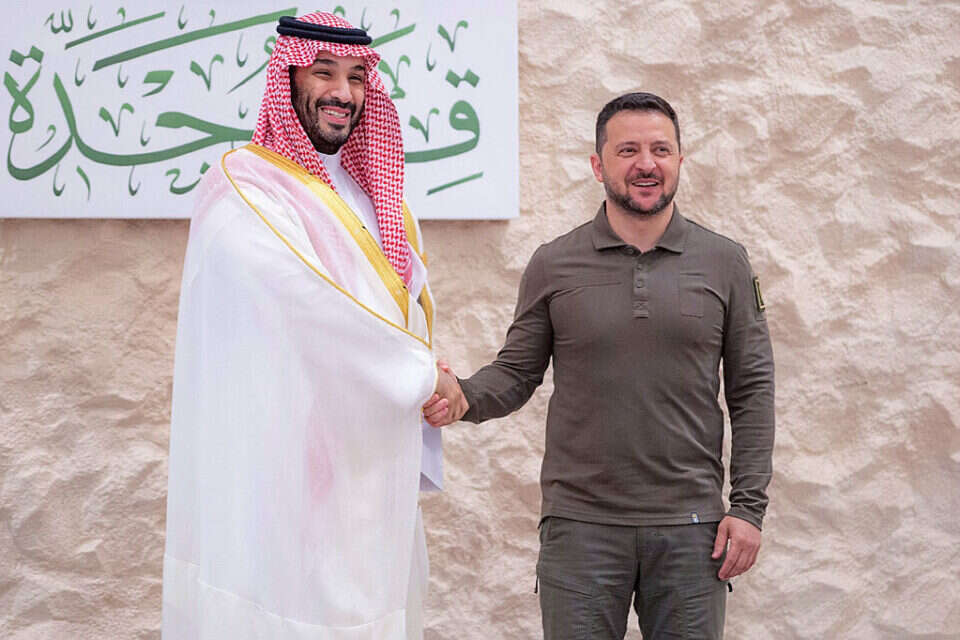Bashar Assad's invitation to the Arab League summit has made big headlines in recent days. Nonetheless, it was the first time since the outbreak of Syria's civil war in 2011 that a president had lost his league status. But another guest at the summit in Jeddah stole the show: Ukrainian President Volodymyr Zelenskyy.
For Saudi Arabia, the invitation was a continuation of the game of neutrality: on the one hand, Riyadh condemned Russia's invasion at the UN and provided Kyiv with $400 million in aid, but on the other hand, refused to join sanctions against Russia.
But for Zelenskyy, the visit to Saudi Arabia was an expression of a shift in strategic thinking: for the first time since the war began, the Ukrainian president appeared in a non-Western country and before a forum of heads of state who are not allies of Ukraine, most of whom want to maintain good relations with the Kremlin, and one of them, Assad, is a loyal ally of Putin, who in fact owes him his survival. "Unfortunately, there are some elements in the world and here, among you, who turn a blind eye to cages with illegal captives and annexations," Zelensky told League members.
Another strong day for Ukraine. Arab League summit. Bilateral meetings – Saudi Arabia, Kuwait, UAE, Oman, Iraq. Security. The release of our people from captivity. Peace Formula. The leader of the Crimean Tatar people, Mustafa Dzhemilev, was with us. Grateful to the Crown Prince,... pic.twitter.com/b0SkmO1ZLl
— Володимир Зеленський (@ZelenskyyUa) May 19, 2023
It is impossible to underestimate the importance of shifting Ukrainian attention to Arab countries. Kiev realized that Western sanctions against Russia would never be effective enough if Russia could always find partners in the Global South, where many countries hold a postcolonial grudge against Western powers and some see Russia as a successor to the Soviet Union that helped them in their struggles for national independence. But there is also a change in self-perception: unlike Russia, Ukraine did not perceive itself as a superpower, or at least a potential superpower, after the dissolution of the Soviet Union, and therefore did not really invest in cultivating its status and influence in Arab countries, Latin America or Africa (and even if it wanted to, it had no means).
When the war broke out, it became clear that the Southern Hemisphere was quite blind to its situation, effectively abandoned to the Russia/West dichotomy and Moscow's narratives about its stand against "Western colonialism." A year later, Ukraine realized that the magnitude of the hour required the growth of matching diplomatic wings, and fast.
For this reason, Zelensky sought to remind Arab countries that Kiev is the victim of the war, and that it is waging an anti-colonial war against Putin imperialism. "We don't have missiles like our enemies have; Our air power is smaller; We don't have the large quantities of attack drones that Iran supplies to Russia; We don't have enough artillery, but we remain strong because the truth is on our side. We will never surrender to foreigners or colonialists," the Ukrainian president told his Arab hosts in a not-so-subtle call to recall their past.
We are adding strength to Ukraine. On the eve of the G7 Summit, I held meetings with @GiorgiaMeloni 🇮🇹, @RishiSunak 🇬🇧, @narendramodi 🇮🇳, @CharlesMichel 🇪🇺, @EmmanuelMacron 🇫🇷, @OlafScholz 🇩🇪. Peace Formula. Protection of people. Joint strengthening of international law.
🇺🇦🇺🇦🇺🇦... pic.twitter.com/ZcNU96uhbu
— Володимир Зеленський (@ZelenskyyUa) May 20, 2023
The next stop on Zelenskyy's journey was the summit of Western leaders in Japan. Among them, Zelensky felt at home, and from them he also received rhetorical support (an unequivocal demand for the withdrawal of all Russian forces from Ukraine) and practical support (new sanctions on Russia, major progress toward the supply of American fighter jets). But G7 leaders face a similar problem, albeit on a different scale: a growing distance between them and the Global South. The distance was particularly striking in light of the refusal of India, Africa and Latin America to support Ukraine, as liberal democracies have done, and of course to participate in sanctions against Russia. "I am amazed at how much we have lost the trust of the Global South," Emmanuel Macron said at the recent Munich conference, apparently echoing the sentiments of many of his colleagues.
Leaders of the countries participating in the Hiroshima summit. Deepening collaboration, photo: AP
But remoteness is seen as a problem and a danger not only because of the war in Ukraine; It may come at a price in global competition with the might of China, which in turn has hosted the heads of state of Central Asia in recent days (and has eroded Russian influence in the region a little more). Beijing's growing ambition, and the realization that the democratic West might find itself isolated from the rest of the world, may have been the main reason for inviting eight visiting countries to the G7 summit: Western Australia and South Korea, but also Brazil, India, Vietnam, Indonesia, the Comoros (representing the Union of African States) and the Cook Islands (representing the Union of Islands in the Pacific). The heads of the large Western economies have realized that even if most countries in the world depend on their pockets, they are not in their pockets – and a lot of work is required of outreach, partnership and advocacy. Ukraine, for its part, has become one of the drivers of the process and one of the players in it.
Wrong? We'll fix it! If you find a mistake in the article, please share with us

